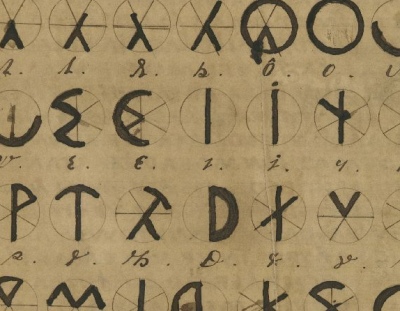
|
The Oera Linda Bookby Wiliam R. Sandbach[1876] |

|
The Oera Linda Bookby Wiliam R. Sandbach[1876] |
In the 19th century, ascendant nationalism in Europe used local folklore and ancient legends to bolster a sense of identity. One curious example of this is the Oera Linda Book, a controversial manuscript, dated 1256, from the Frisian region of the Netherlands. The Oera Linda book is today conventionally agreed to be a forgery, written during the mid-19th century. This is based on the paper which the manuscript is written on, as well as internal and linguistic evidence.
Purporting to be an episodic chronicle of wars and migrations of the Frisian people, the Oera Linda Book describes events dated (very precisely) from 2194 BCE to 803 CE. The reference date is the submergence of 'Atland,' a lost land in the North Sea, which, according to the book, occurred in 2193 BCE. The book is peppered with descriptions of catastrophic earth changes, including volcanic eruptions, strange weather, and rapid sea level changes. This is intriguing because, even if a forgery, the Oera Linda Book predates the origin of the modern Atlantis craze, which began with Ignatius Donnelly's Atlantis, the Antediluvian World, published in 1882.
The Oera Linda Book also claims that Europe was ruled by a (mostly) peaceful, just matriarchy for most of its history, and that the Frisians invented writing. There is a dark side, too: parts of the Oera Linda Book have touches of bigotry and intolerance which will be galling to most modern readers. This mix of themes have led to a continued fascination with this text, regardless of its authenticity.
PRODUCTION NOTES: I was unable to obtain a printed copy of this edition, so I printed out and scanned back in a Google page image PDF, which does not give the best OCR yield. Hence there may still be OCR errors lurking in this text. I had to omit the parallel Frisian text on facing pages for technical reasons. Most of the footnotes in the body of the text had to be placed at an inferred position, as for the most part the footnotes refer to the Frisian text, not the English. For this reason the place name references in the footnotes are logically reversed. As far as I can tell, this is the first time that an unmodified transcript of this translation of the Oera Linda Book has appeared online.--J.B. Hare, January 29th, 2009.